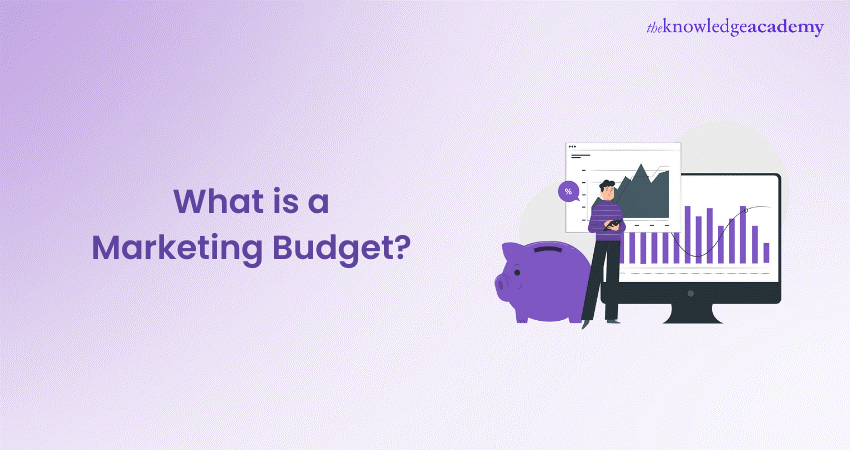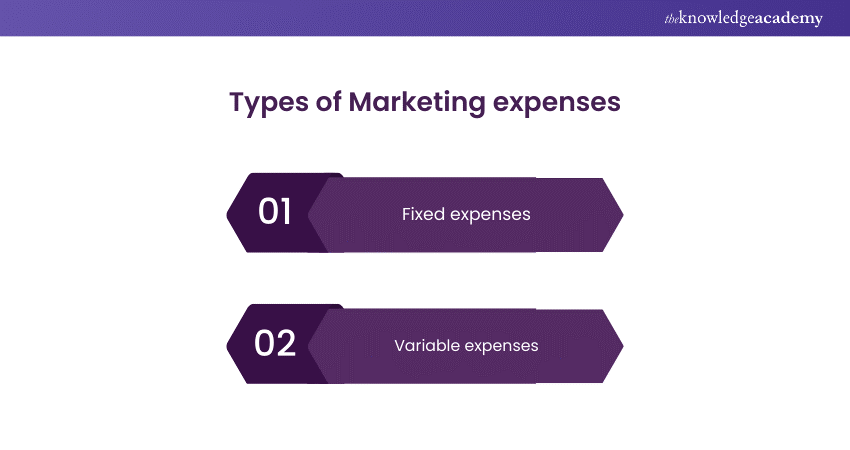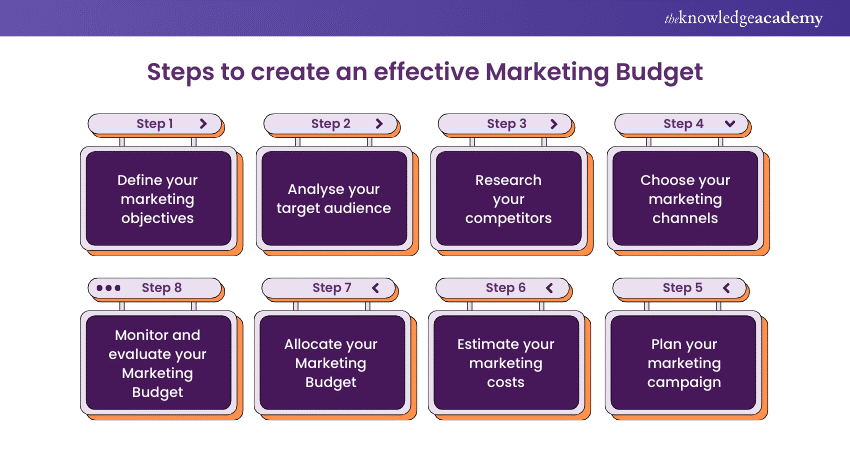We may not have the course you’re looking for. If you enquire or give us a call on +44 1344 203999 and speak to our training experts, we may still be able to help with your training requirements.
Training Outcomes Within Your Budget!
We ensure quality, budget-alignment, and timely delivery by our expert instructors.

Marketing is essential for any business that wants to grow and succeed. But how do you know how much to invest in your marketing efforts? How do you track and optimise your spending? How do you align your marketing strategy with your business objectives? The answer is simple: you need a Marketing Budget. In this blog, we will show you What is a Marketing Budget, what are the different types of marketing expenses, what are the benefits of having a Marketing Budget, and how to create an effective Marketing Budget for your business.
Table of Contents
1) Understanding What is a Marketing Budget?
2) Different types of Marketing expenses
3) Benefits of Marketing Budget
4) Importance of having a Marketing Budget
5) Steps to Create an effective Marketing Budget
6) Conclusion
Understanding What is a Marketing Budget?
A Marketing Budget is a detailed breakdown of how much money you will spend on your marketing activities over a specific period of time. It can be monthly, quarterly, or yearly, depending on your business needs and goals. A Marketing Budget covers all the costs associated with your marketing strategy, such as advertising, content creation, social media, email marketing, SEO, events, and more.
A Marketing Budget is not a fixed amount but rather a flexible and dynamic plan that can be adjusted as you go along. A Marketing Budget is based on your objectives, target audience, competitors, industry, and available resources.
Different types of Marketing expenses
There are many ways to categorise your marketing expenses, but one common method is to divide them into two main groups: fixed and variable.

Fixed expenses are the ones you must pay regardless of your sales or performance, such as salaries, rent, software subscriptions, etc.
Variable expenses are the ones that depend on your sales or performance, such as advertising, commissions, incentives, etc.
Fixed expenses are usually easier to plan and budget for, while variable expenses require more monitoring and analysis. You should aim to balance your fixed and variable expenses so that you can cover your essential costs and still have room for growth and experimentation.
Dive into a world of marketing possibilities with our Marketing Courses – Choose your path to success today!
Benefits of Marketing Budget
Having a Marketing Budget has many benefits for your business, such as:
a) It assists in the smart and efficient distribution of your resources by focusing on the most successful and lucrative marketing channels and strategies.
b) It helps you measure your marketing performance and Return on Investment (ROI) by comparing your actual spending and results with your planned budget and goals.
c) It helps you improve your decision-making and problem-solving by identifying what works and what doesn’t and making adjustments accordingly.
d) It helps you align your marketing strategy with your business objectives by ensuring that your marketing activities support your overall vision and mission.
e) It helps you communicate your marketing plan and expectations to your team, stakeholders, and partners by providing a clear and transparent overview of your marketing activities and costs.
Unlock the power of effective marketing for your business – Join our Business Marketing Strategies Training now!
Importance of having a Marketing Budget
Having a Marketing Budget is important for any business that wants to succeed in the competitive and dynamic market. Without a Marketing Budget, you risk:
a) Overspending or underspending on your marketing activities can hurt your cash flow and profitability.
b) Spending time and resources on inefficient or unrelated marketing channels and strategies can harm your brand's reputation and diminish customer loyalty
c) Missing out on opportunities and trends can limit your growth and innovation potential.
d) Losing track and control of your marketing performance and ROI can affect your decision-making and problem-solving abilities.
e) Confusing or disappointing your team, stakeholders, and partners can harm your collaboration and trust.
Steps to create an effective Marketing Budget
Developing a successful Marketing Budget is a continuous process, not a singular task, necessitating consistent research, analysis, and assessment. Here are some steps to follow to create an effective Marketing Budget for your business:

a) Define your marketing objectives: What are the specific and measurable objectives you aim to accomplish through your marketing efforts? For example, increase brand awareness, generate leads, boost sales, etc.
b) Analyse your target audience: Who are the ideal customers that you want to reach and engage with your marketing activities? What are their demographics, psychographics, behaviours, needs, and preferences?
c) Research your competitors: Who are the competitors that offer products or services similar to yoursended market? What are their strengths, weaknesses, opportunities, and threats? How do they market themselves?
d) Choose your marketing channels: What are the best platforms and mediums to reach and communicate with your target audience? For example, website, blog, social media, email, video, etc.
e) Plan your marketing campaigns: What are the specific methods and tactics that you will use to execute your marketing strategy on each channel? For example, SEO, content marketing, PPC, influencer marketing, etc.
f) Estimate your marketing costs: How much money will you need to spend on each channel and campaign? You can use historical data, industry benchmarks, or online tools to estimate your marketing costs.
g) Allocate your Marketing Budget: How do you plan to allocate your Marketing Budget among various channels and campaigns? You can use different methods, such as percentage of sales, objective and task, competitive parity, etc.
h) Monitor and evaluate your Marketing Budget: How will you track and measure your marketing spending and results? You can use different metrics, such as impressions, clicks, conversions, revenue, etc. You should also compare your actual spending and results with your planned budget and goals and make adjustments as needed.
Unlock the power of effective marketing for your business – Join our Business Marketing Strategies Training now!
Conclusion
A Marketing Budget is a vital tool for any business that wants to grow and succeed. It helps you plan, manage, and optimise your marketing activities and costs. Additionally, it aids in aligning your marketing strategy with your business goals and in evaluating the effectiveness and ROI of your marketing efforts. In this blog, we have explained What is a Marketing Budget, what are the different types of marketing expenses, what are the benefits of having a Marketing Budget.
Drive ROI and success with our Marketing Budget Masterclass – Join the course to maximise your budget!
Frequently Asked Questions

The answer to this question is not absolute, as it varies based on several elements like the scale of your business, the sector you operate in, your objectives, available resources, and so on. However, a general rule of thumb is to spend between 5% and 15% of your revenue on your Marketing Budget, depending on your growth stage and objectives.

You should review and update your Marketing Budget regularly, at least once a quarter, or more frequently if needed. You should also review and update your Marketing Budget whenever significant changes in your business environment, such as new opportunities, threats, competitors, etc.

The Knowledge Academy takes global learning to new heights, offering over 30,000 online courses across 490+ locations in 220 countries. This expansive reach ensures accessibility and convenience for learners worldwide.
Alongside our diverse Online Course Catalogue, encompassing 17 major categories, we go the extra mile by providing a plethora of free educational Online Resources like News updates, Blogs, videos, webinars, and interview questions. Tailoring learning experiences further, professionals can maximise value with customisable Course Bundles of TKA.

The Knowledge Academy’s Knowledge Pass, a prepaid voucher, adds another layer of flexibility, allowing course bookings over a 12-month period. Join us on a journey where education knows no bounds.

The Knowledge Academy offers various Marketing Course, including Marketing Budget, Intergrated Marketing and Business Marketing Strategies Courses. These courses cater to different skill levels, providing comprehensive insights into Business Marketing .
Our Digital Marketing blogs cover a range of topics related to Marketing, offering valuable resources, best practices, and industry insights. Whether you are a beginner or looking to advance your Digital Marketing skills, The Knowledge Academy's diverse courses and informative blogs have you covered.
Upcoming Digital Marketing Resources Batches & Dates
Date
 Introduction to Marketing Training
Introduction to Marketing Training
Fri 22nd Nov 2024
Fri 10th Jan 2025
Fri 14th Mar 2025
Fri 9th May 2025
Fri 11th Jul 2025
Fri 12th Sep 2025
Fri 14th Nov 2025







 Top Rated Course
Top Rated Course



 If you wish to make any changes to your course, please
If you wish to make any changes to your course, please


